30 Years Later, ‘Reservoir Dogs’ Tipping Argument Is Still Full Of Crap
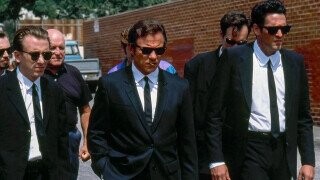
Today marks the 30th anniversary of Quentin Tarantino’s Reservoir Dogs – or as it was known back in 1992, some crime movie directed by a dude who was briefly in The Golden Girls one time. Other than the scene where a cop is violently Van Gogh’d to the smooth sounds of Stealers Wheel, perhaps the most memorable part of the movie is the opening pre-credit scene, in which the group of (unnecessarily stylish) jewel thieves eat breakfast at a greasy spoon diner. Unlike other crime movies, though, these crooks exchange witty banter about everyday subject matter as if they were (more murderous) Seinfeld characters.
Famously, at the end of said breakfast, Steve Buscemi’s character Mr. Pink refuses to leave a tip for their server, stating that he doesn’t “believe in it” – as if tipping were the Easter bunny or J.K. Rowling.
While the other members of the group rebut Pink’s argument with mostly well-articulated counterpoints, it sure seems like the movie itself is trying to actively call out a societal fallacy – an interpretation seemingly confirmed by Buscemi, who later claimed that Pink’s point of view is “pretty much exactly how Tarantino feels about tipping.” Which is a problem because Mr. Pink is staggeringly full of crap on a number of fronts.
Don't Miss
Let’s start with Pink’s argument that tipping is inherently hypocritical. When Mr. White points out that waiting tables is “hard work,” Pink snaps back, “So is working at McDonald’s.” He then declares that customers don’t tip those employees purely because “society says” not to …

Miramax Films
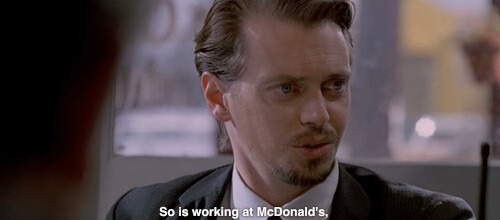
Miramax Films
But this justification has a major flaw. Sure, McDonald’s employees generally aren’t tipped, but this isn’t only because of some collective cultural blindspot; it’s because, from all accounts, McDonald’s corporate policies specifically ban employees from accepting tips. Even if a customer tells them to keep the change, they reportedly aren’t allowed to pocket the money. Instead, McDonald’s suggests that appreciative customers, “show your appreciation with a friendly thank you or tell the manager how happy you are with the service.” And, by the way, this is the same company that once urged their employees to generously tip workers, such as au pairs and pool cleaners, during the holidays. Later deleting the post and presumably collecting the highest possible award in the field of tone-deafness.
Mr. Pink also comments that servers are ultimately “just doing their job” and “aren’t starving to death” because “they make minimum wage.” He even recalls that he, too, once worked for minimum wage but “wasn’t lucky enough to have a job that society deemed tip-worthy.”
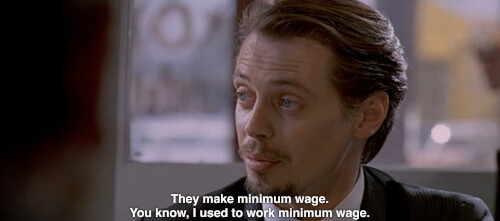
Miramax Films
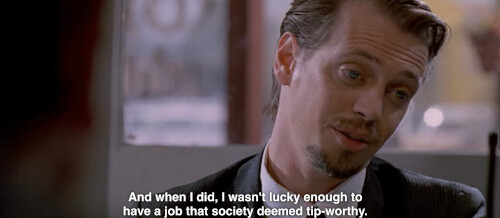
Miramax Films
Further proving that fictional burglars aren’t an ideal source for economics lessons, this, too, is way off-base. Pink implies that restaurant servers make the same minimum wage that he once did, plus have the good fortune to be in a position to get an extra cash bonus in the form of customer tips. But this isn’t always how this works in the U.S. The Federal minimum wage for a “Tipped Employee,” someone in a job who “customarily … regularly receives more than $30 per month in tips,” is different than the minimum wage for everyone else (like Mr. Pink) – and it’s pretty damn low.
Right now, the minimum wage for Tipped Employees is just $2.13 an hour. And if you’re wondering what it was back in the days of Reservoir Dogs, let’s just calculate the infl – wait, no, it was exactly the goddamn same! Yup, the “federal tipped minimum wage has been stuck at $2.13 since 1991.” The last time they raised this amount, the first Jurassic Park movie didn’t even exist. Cardi B hadn’t been born yet. Hearing the name “O.J. Simpson” still made people think of football and/or The Naked Gun. Really, if anyone should have been boosting diamonds in the world of Reservoir Dogs, it was the waitstaff of Uncle Bob’s Pancake House.
In a broad sense, Mr. Pink is right to some extent – tipping is a nightmare – although he doesn’t elucidate why. Tipping has its roots in Medieval serfdom, where a “servant would receive extra money for having performed superbly well,” and also slavery. Shortly after slavery was abolished in the U.S., Black people in the South who secured jobs such as waiters, barbers, and porters found that “many employers would not actually pay these workers, under the condition that guests would offer a small tip instead” because these “industries demanded the right to basically continue slavery with a $0 wage and tip.” And the creation of the subminimum wage in the 1930s, which allowed tips to be counted towards the newly-created federal minimum wage, was an inherently discriminatory legal decision, disproportionately affecting people of color and women.
Modern tipping is still a big problem, falling prey to the sexism and racism of tippers, which then leads to a wildly inequitable distribution of tips and also potentially increasing rates of sexual harassment. The case could be made to get rid of tipping altogether – but in order to do that, workers need to be protected and, at the absolute very least, paid a wage they can live on.
Mr. Pink suggests that he only tips when he gets “special” treatment; when servers “really put forth the effort” and offer him “something extra.” Which is a repulsively entitled position to take given the country’s long history of systemic exploitation of the service industry; one that has ensured that tips aren’t really a gratuity at all, but rather, an essential component of many people’s earnings. Mr. Pink does respond to suggestions that the government is screwing over servers by insisting that he would vote to stop that, or sign a petition were someone to hand it to him.
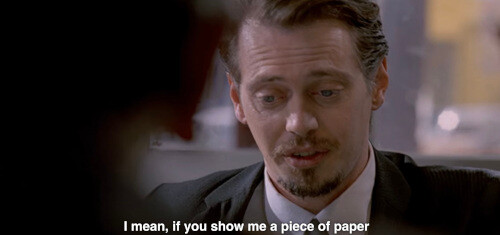
Miramax Films
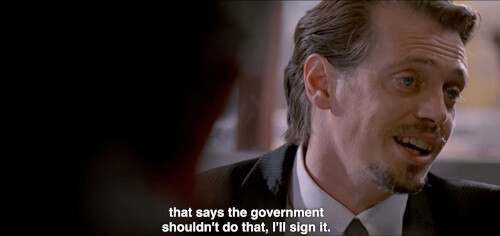
Miramax Films
But clearly Mr. Pink has taken no actions to change anything beyond simply refusing to tip, without ever investigating the larger problems at play. Really, Pink withholding his tip out of protest is a little like opposing the business practices of Jeff Bezos by sucker-punching an Amazon delivery guy in the face.
You (yes, you) should follow JM on Twitter!
Thumbnail: Miramax Films